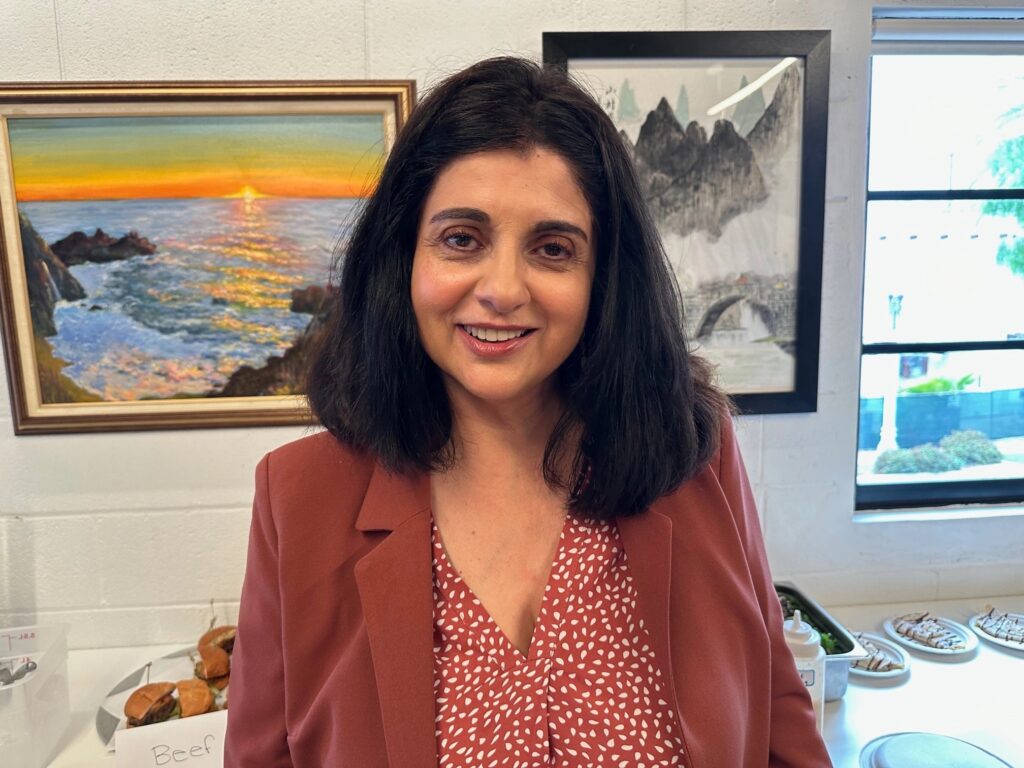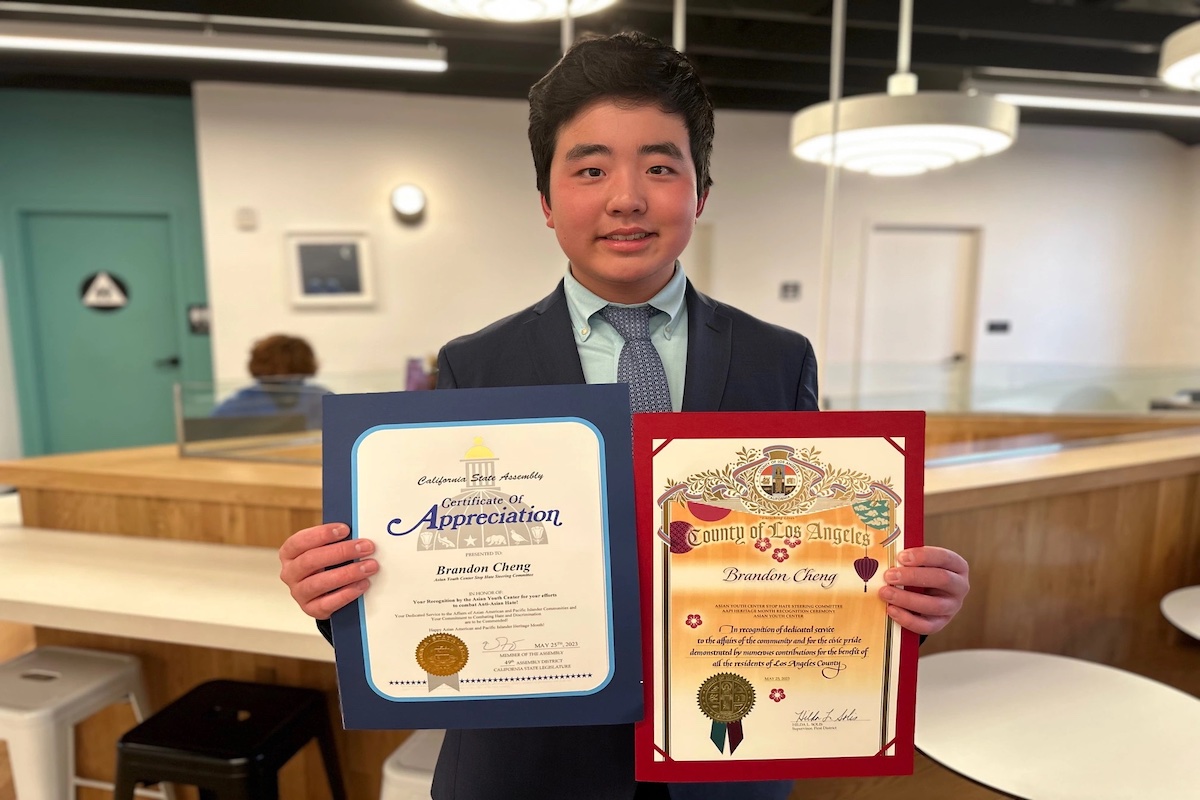By Araceli Martínez Ortega | La Opinión
Above: Brandon Cheng, 16, founder and ED of the student-led non-profit Foundation for Asian American Visibility. (Credit: Araceli Martínez)
Brandon Cheng, a 16-year-old high school student in the San Gabriel Valley, is deeply hurt by the hatred he sees being directed toward the Asian American community.
“When I see Asian American elders being pushed and shoved to the ground, I think they could be my grandmother or grandfather,” he said.
Cheng, founder and executive director of the student-led non-profit Foundation for Asian American Visibility, says hatred toward the AAPI community is a deeply personal issue for many Asian Americans.
“That anger, that sadness, that frustration that we experience from seeing these horrible scenes of hatred is what has really propelled us into action to seek change,” he explained.
Cheng was among a group of community advocates, artists and residents honored during the AAPI Heritage Month Recognition and Celebration Ceremony. TK CHECK NAME+ DATE
“We’ve seen a significant increase in anti-Asian hate in the last couple of years; and a lot of it is due to the invisibility of Asian Americans in so many public spaces, in school curriculums and in communities across the country, and that’s something we want to change,” noted Cheng, who was born in the city of Arcadia, California, to immigrant parents from Taiwan and China.
To counteract the hatred, Cheng’s group is conducting interviews with community members. “We are also making sure to partner with local groups and cities to ensure that they take the necessary steps to ensure Asian American visibility.”
His message to the community is to raise their voices for those who are threatened.
“It’s about taking action, not just putting a slogan on social media saying we’re against Asian hate, but making sure that whoever is suffering… feels like they have an ally on their side.”
Since the onset of the pandemic, incidents of racially motivated verbal and physical abuse have increased at an alarming rate. According to the 2021 San Gabriel Valley Stop Hate Community Survey, conducted by the Asian Youth Center (AYC), Asian Americans Advancing Justice Southern California and LA vs Hate, 31% of respondents reported that either they or a family member had experienced a hate incident since the start of the COVID -19 pandemic.

In response, AYC launched its Stop Hate program in late 2021, focusing on education, engagement, community mobilization, and empowering residents to prevent, intervene, and recover from hate incidents.
“During the pandemic, hate incidents were really bad, then it looked like everything was getting better, but then again they got worse. So, we’re seeing ups and downs in incident reporting,” said AYC Executive Director Michelle Freridge.
“We need to continue to educate the Asian American community about how to report hate crimes and the resources that exist for solutions, and we need to continue to educate the non-Asian community about what’s going on,” she added.
Among the survey’s findings was an increased sense of fear in the community, particularly visible when kids began returning to school following prolonged closures during the pandemic.
“Parents were worried about bullying because of Asian hate. Fear paralyzes people from going about their daily lives, taking care of their businesses and families,” explained Freridge, adding that more resources and more interaction between API and non-API communities is needed.
“People need to build relationships around issues and work together to solve those that affect everyone. You need to build coalitions around housing, inflation, migration, education and all kinds of issues. By working together, we are going to reduce racism and hate.”
AYC’s Stop Hate Program encompasses a variety of initiatives, including anti-bias training and workshops as well as bystander intervention, community outreach, education, youth development and arts-based cultural work.
“We have anti-hate programs and very active youth,” says Denise Menchaca, a Latina councilwoman from San Gabriel, who served as mayor of that city during the pandemic and promoted the formation of AYC’s Stop Hate Steering Committee.
“It started with the murder of George Floyd, but we saw how it targeted Asians during the pandemic. Mexicans, we experienced it when former President Trump told us we were rapists and murderers; and the LGBT community suffers.”
Menchaca says the city now provides a wider range of translations for various events and services.
“We are organizing a mental health expo in different languages; we have workshops to educate employees about prejudice; and little by little we are doing different activities to make everyone feel included.”
The community comes together
Chasity Jennings-Nunez sits on the Human Equity, Access and Relations (HEAR) commission for the city of San Gabriel. She says that since the pandemic, the community has come together to protect themselves, and that people feel more empowered to report hate incidents.
“Before, they felt afraid to speak up and ask for help. Our police department has been very proactive in making people feel safe to report violence.”
She adds it’s important for all communities to understand that we have a common struggle and need to advocate for each other.
“Together we are going to grow and stand up. If we support, advocate, protect and celebrate each other, we are going to rise together.”
Jennings-Nunez says the Monterey Park shooting in January brought greater awareness around mental health, especially within the API community, where there is often a stigma around mental health.
“The committee I’m on is going to hold a Mental Wellness Expo in October so that people understand that mental health is like physical health, and they shouldn’t be afraid to seek help just like we do with a diabetes or hypertension.”
The San Gabriel Stop the Violence committee has helped design projects such as Multicultural Art Popups, Unconscious Bias, and Allyship Training, which AYC began implementing earlier this year.
Target of Hate
Jeanne E. Raya, a Latino businesswoman honored for her involvement with the Stop the Hate Committee, says that as a fourth-generation resident of the city of San Gabriel, she has seen how the targets of hate have changed over the decades.
“It’s important to try to build a sense of community because we are all different and we need to learn to communicate, respect and appreciate each other.”
Raya says that while there are services available for healing from hate, the most effective resources are those that come from the community.
“For example, after the Monterey Park shooting, all the officials came out because it was a pretty significant event. But really the healing comes from within the community who know the people who were victims and knew that this dance studio was important within their community.
“So the healing has to come from within ourselves, helping each other and understanding that behind every person is a human being with the same problems, experiences and who wants like you to live in peace, be happy, work, go home and be with their family.”

Monterey Park
Billy Taing, co-director of API Rise and co-founder of the African American and Asian American and Pacific Islander solidarity group, who came to the country at age three as a refugee and spent two decades of his life in prison for a bad decision in his youth when he got involved with gangs, says he has known hatred since childhood when his father was beaten in front of his family in Cambodia and never seen again.
“My life was scarred from the time I was one-and-a-half years old, and in my youth and in the prison system I witnessed a lot of hate. That’s why serving my community is a lifelong healing process for myself and I hope others can find that in our communities.”
Taing grew up in Monterey Park and says the shooting hit close to home.
“It was unbelievable… and it motivated me to create the Stop the Violence Committee to find a way to stop it or eliminate the violence.”
Asian Heritage Month
San Gabriel Councilmember Tony Ding, a first-generation immigrant, says many Asian immigrants and even U.S.-born children of Asian immigrant parents feel they are perceived as not being part of this country.
“That’s why we want to use Asian Heritage Month to tell them that we are part of America… and to show our appreciation for this country that has given us everything, education and opportunities.”
He adds that the Stop the Hate Committee in San Gabriel was created to help unite and to foster cultural exchanges that make it easier to understand and learn from all the cultures that coexist there.
“Hate is like a virus, love is a vaccine; and we don’t want any kind of hate in our community. We want to live in harmony.”
This resource is supported in whole or in part by funding provided by the State of California, administered by the California State Library in partnership with the California Department of Social Services and the California Commission on Asian and Pacific Islander American Affairs as part of the Stop the Hate program. To report a hate incident or hate crime and get support, go to CA vs Hate.






